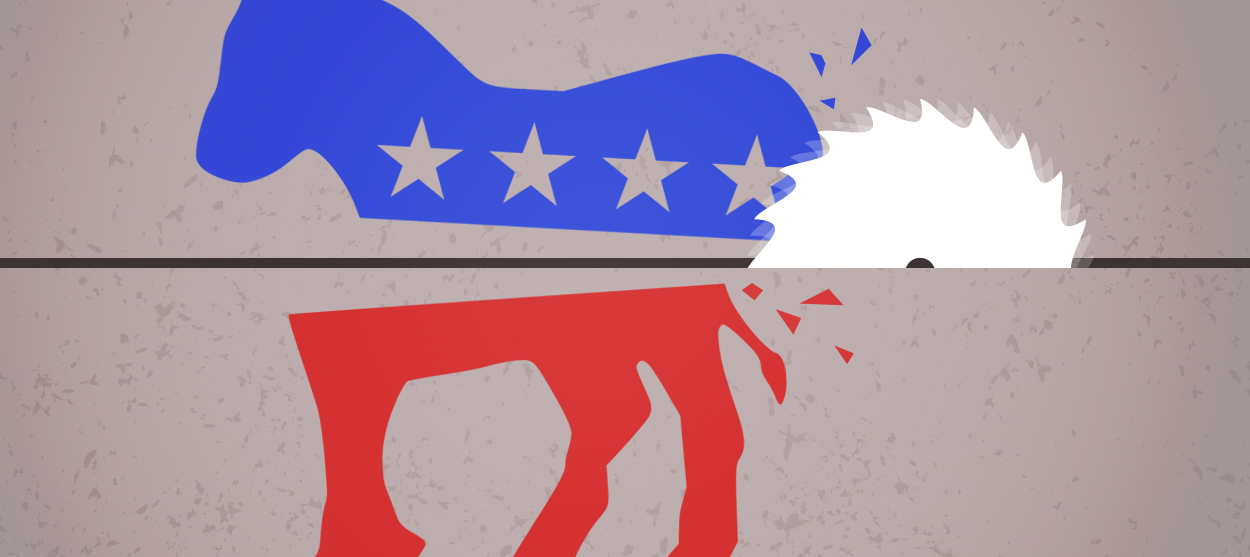Democrats are running into Trump's economic buzzsaw
If you're a president who promised to make America great again, and the unemployment rate falls to its lowest level since the early 1950s, it looks like you're making American great again


A free daily email with the biggest news stories of the day – and the best features from TheWeek.com
You are now subscribed
Your newsletter sign-up was successful
Call it the Back-up Plan.
For the past couple of years, the potential for an economic downturn has kept jittery Democrats from getting too nervous about the 2020 presidential election. Even if Robert Mueller and his Russia investigation didn't get President Trump — and now the Ukraine impeachment investigation — then the American economy surely would. There was no way four years of Trump's trade wars and general incompetence wouldn't result in a nasty recession and a one-term Trump presidency, right?
Now it's looking more and more like the back-up plan might need a back-up plan. Wall Street economists and forecasting models don't see more than a one-in-three chance of an economic downturn next year. There's even a reasonable scenario of an economic upturn. In its outlook for next year, Goldman Sachs predicts economic growth accelerating from its current 2 percent pace to 2.5 percent, thanks to a quieting of the trade war and the lagging impact of Federal Reserve rate cuts. Recession odds: Just 20 percent, which is pretty standard in any given year.
The Week
Escape your echo chamber. Get the facts behind the news, plus analysis from multiple perspectives.

Sign up for The Week's Free Newsletters
From our morning news briefing to a weekly Good News Newsletter, get the best of The Week delivered directly to your inbox.
From our morning news briefing to a weekly Good News Newsletter, get the best of The Week delivered directly to your inbox.
But this is the part of the forecast that should really worry Democratic campaign strategists: "Solid growth should mean another year of above-trend job gains. We expect the unemployment rate to fall to levels last seen during the Korean War, bringing a further pickup in wage growth to 3.5 percent." So not only rising take-home pay with low inflation, but a jobless rate so historically low that even the oldest boomers have little memory of such a time. Look, if you're a president who promised to make America great again, and the unemployment rate falls to its lowest level since the early 1950s, it arguably looks like you're making American great again.
Of course, this is just one forecast. But even if next year is just pretty much like this year, not much better or worse, it would still mean an economy experiencing a record-long expansion that would be well into its 11th year by Election Day 2020. Not that 2020 Democratic nominees will lack a counter-argument. They will likely argue that most Americans aren't benefiting from the expansion. As South Bend, Indiana, Mayor Pete Buttigieg said at the last Democratic debate, "In an economy where even when the Dow Jones is looking good, far too many Americans have to fight like hell just to hold on to what they've got."
The problem with such an approach is that even though Democrats are loathe to admit it, this is an expansion that's finally helping a broad swath of Americans. Wages are actually growing fastest at the bottom right now, not at the top, and that reality is playing a big role in keeping the expansion on track. Nor should Democrats dismiss the low jobless rate. It's not some phony number. For instance: Employment for prime-age workers has now completely recovered from the 2008 financial crisis even though many economists fretted it never would. To many Americans, the Trump economy is going to seem a lot better than the Obama economy.
Another option is to focus on specific issues that voters care about and where Democrats might have an edge, most notably health care. It sure seemed to work in the 2018 congressional midterms. But Democrats are blowing it this time around. Rather than push for an expansion of ObamaCare — which Americans favor 52 percent to 41 percent — leading candidates such as Bernie Sanders and Elizabeth Warren have pushed "Medicare-for-all." But the more people hear about the idea — the fiscal cost, the elimination of private health insurance, the lost health-care jobs — the less they seem to like it. A new Quinnipiac poll finds "Medicare-for-all has grown increasingly unpopular among all American voters, as 36 percent say it is a good idea and 52 percent say it is a bad idea." And while frontrunner Joe Biden supports adding a public option to ObamaCare, Trump can easily argue that the real Democratic goal is eventually getting to Medicare-for-all.
A free daily email with the biggest news stories of the day – and the best features from TheWeek.com
Maybe the best tact is to simply argue that Trump shouldn't get much credit for the boomlet. After all, the decent economic news looks like a steady continuation of trends begun during the Obama presidency. And any good the Trump tax cuts might have done may have been offset by the Trump trade war. So what did Trumponomics do, exactly? Yet voters still have a tendency to credit presidents for the good that happens on their watch, although not as much as they used to. Hoping voters simply ignore their pocketbooks and 401ks isn't much of a Plan C.
Want more essential commentary and analysis like this delivered straight to your inbox? Sign up for The Week's "Today's best articles" newsletter here.
James Pethokoukis is the DeWitt Wallace Fellow at the American Enterprise Institute where he runs the AEIdeas blog. He has also written for The New York Times, National Review, Commentary, The Weekly Standard, and other places.
